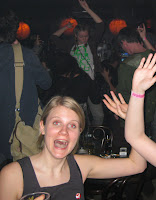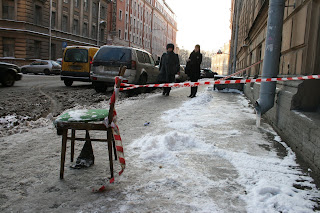The title is an inside joke. And I'm so happy and proud that I have inside jokes with Georgian people. You may already guess what a perfect trip me and Heidi had to Tbilisi, Gori, Signari and Mtskheta!




Of course the Western (or at least Scandinavian) system is not perfect either. Instead of valuing virginity, for us it’s a symptom of freakiness. The opposite social pressure, the demand to have sex leads to too early sexual experiences. In Finland it’s more and more common that girls of age 12-13 have sex already. That’s at least as dangerous as the demand of virginity.
The different up-bringing of girls and boys in Georgia is a symptom of a patriarchal culture. Hannu Raittila argued in his new book ”Ulkona” (my great, great travel book in Georgia) accurately: Welfare society is the best thing women have faced. When the society is family-centred, it’s usually also patriarchal and men-dominated. Welfare society with its kindergartens and gender equality programs liberate women from the economic dependence of their fathers and husbands. In Georgia women are highly appreciated by men but they’re also expected to have children and take care of housework (including washing their husband’s shitty underwear: sentence from which I’ll be remembered in Georgia). Childless woman is one of the biggest tragedies in Georgia, which is also the reason why our friends couldn’t understand why we consider adoption to be an option for getting a child.
Heidi and me were also a bit offended when (male) acquaintances of our Georgian friends didn’t shake our hands or spoke to us. When we asked about it, Georgians explained that even though they didn’t speak to us, they spoke all the time about us. They just valued our space so much that they didn’t feel that it would be appropriate to speak to us. That may be the truth but me and Heidi sensed patriarchalism is this tradition: women are ”owned” by their father or husband which is the reason men also discuss for the women as well while women are left out of the conversation. But still after the explanation were felt less offended, they were just really polite to us in Georgian style.
Even though we disagreed greatly in some things, we had super good conversations with our Georgian friends. Usually I have such an in-depth conversations only with my boyfriend and with my closest friends. We were amazed how thoughtful and deep 20-year-old Georgians could be. Still few days after the trip I have been floating in this strange spiritual mood: one week of good discussions left stuff to think about at least for the next month. Even though Heidi and I have travelled quite a lot, at least I haven’t meet such political youngsters who also appreciate their traditions more than any other nation I have met. And indeed we got the opportunity to participate Georgian traditions also by ourselves!

Hospitality is one of the most famous and highlighted traditions in Georgia. ”Guest are gift from God” we heard more than once or twice. Heidi and me tried to fight to pay our own meals but it turned out to be impossible: for Georgians guests are always only a joy, which is why they wanted to pay all the meals for us. Guests are invited to join Georgian style dinner supra, which is a traditional feast with wine and food more than you could ever imagine. Georgian food is above excellent: khatsapuri with cheese, potato or mushrooms; pkhali with beans, nuts or spinach; lobio with beans; khinkali with mushrooms and potatoe; aubergines with nut sauce; cheese filled mushrooms; fresh Georgian-produced vegetables and fruits; spicy adzhika or ajapsandali and so on. And as vegetarians we could only taste the meatless dishes which was big tragedy for our hosts (in Georgia being a vegetarian is just a big joke). In supra you flush the food down with excellent Georgian wines, which you’re only allowed to drink when the toastmaster, tamada, rises his glass and proposes a next toast. Unlike in Russia, you don’t drink only for ”health”, ”beauty” of ”friendship” but you listen a five to ten minute speech about various topics with long explanation and historical background of the toast. That’s why you can never really get drunk in Georgia because you only drink at the same time with others. In Georgia is a shame to be drunk (yet another thing which makes Georgians more Europeans than Russians). We enjoyed supra more than once but what was shocking for us Finns was the fact that part of the tradition is to order so much food to the table that you manage to eat only max. ¼ of the dishes. All food is shared but still my Finnish children-starve-in-Africa-and-there-was-the-winter-war-so-finish-your-food-heart was crying to see all the food go to the bin. All the khatsapuris I could save to my stomach are thrown away all the time!

Despite the abuse of food, the best memories of Georgia are from supras which we had with Ziki, Zuka, Kate, Irakli, Levan and George. The toasts toastmaster raised led to good discussion about love, future, politics and life in general. Even thought some of the toasts were rather sentimental, Heidi and me jumped straight into the tradition. I could speak about love and life in a way, which would have felt super ridiculous in Finland (where people rather shut up than reveal their deepest thoughts). In Georgia it felt just normal. Maybe I dropped part of my Finnish cynicism to Georgia (hah, I wish).
Other great tradition of Georgians is their summerhouse culture, which is amazingly similar to Finnish one. We had a great opportunity to visit Irakli's family’s summer house in Eastern part of Georgia which was one of the most beautiful areas I have ever seen: snow-topped Caucasus mountains on the background, wine yards and sheep shepherds on the green countryside which was filled with medieval castles and churches. Another surprising thing was the amount of donkeys we saw: in almost every back yard there was a donkey helping in the farm work. The summerhouse was quite similar with the Finnish ones: with garden to grow own vegetables, small (empty) animal shelters and modest rooms for sleeping. Actually the house where we were was above average but the summer cottage culture was quite Finnish: the houses are the home farms of the parents of our friends and Georgian children spend their summers at the countryside. Parents and students visit summer places on holidays and weekends. Just like we in Finland!
In addition to the supras and cottage trip offered by our friends we faced amazingly open-hearted hospitality from total strangers as well: babushka at the orthodox church fed us with home-made cup-cakes, taxi driver's babushka sent us bag full of famous Gori apples and the relatives (babushka again) of our friends offered us a really good dinner in Gori, in their super fancy restaurant which usually hosts political and economic elite of Georgia. Less attractive part of Gori was the museum of Stalin; the museum is the center of the small city and some how the guide forgot to tell us the bad things Stalin did. Our guided tour went more or less like this: "Stalin was born here, he also studied here, then he was chosen to be the leader of Soviet Union, then he wan the war against nazis and then he died". What happened to the 27 million dead Soviet people and to Ukrainian famine? Luckily intelligent Georgians (like our friends) know truth about their anti-hero.

All in all on our Georgian turnée I learned more about international politics (the Georgian-Russian war was one of the main topics in our conversations), life and from Georgian culture (now I sound sentimental in Georgian style again) and I think our Georgian friends also got something (gender equality I hope) to think about from us. Heidi and me promised to be Finnish godmothers for the future children of our friends and to put some feminists ideas into the heads of little Georgian boys and girls. In the same way I hope that Georgian friends would teach parts of their culture for Finns: especially appreciating older people and valuing traditions are things we should learn from Georgians.
Any way, fundamentally we're quite similar: small 5 millions people's countries next to Russia, with our unique languages nobody speaks enjoying our summer cottages and beautiful nature.
p.s. Returning to Russia after Georgian hospitality was a smaller culture shock than I expected: babushkas in the bus offered me some shampanskoje to celebrate the Victory Day which today fills the streets of Russian cities with army parades and concerts.








 Petersburg blow your mind. The goods ones are not on the main streets or near
Petersburg blow your mind. The goods ones are not on the main streets or near 


 only meet nice Finnish girls here instead of making Russian mates. Well I got one new Russian friend (the boy whom I met in bar which is apparently the only place to meat new people) and we met once on a walk which started a bit confusingly: this Russian maladoi tselovek (=young person, which is what they call young men here) fell down on a slippery street which was a bit funny because he got so embarrassed. After he survived from his shame (it took quite a long time) it was nice to speak some Russian but with my language skills I can keep up a conversation max. 2 hours. If I meet him again, I don't have any new things to tell him, at least not in Russian.
only meet nice Finnish girls here instead of making Russian mates. Well I got one new Russian friend (the boy whom I met in bar which is apparently the only place to meat new people) and we met once on a walk which started a bit confusingly: this Russian maladoi tselovek (=young person, which is what they call young men here) fell down on a slippery street which was a bit funny because he got so embarrassed. After he survived from his shame (it took quite a long time) it was nice to speak some Russian but with my language skills I can keep up a conversation max. 2 hours. If I meet him again, I don't have any new things to tell him, at least not in Russian.





